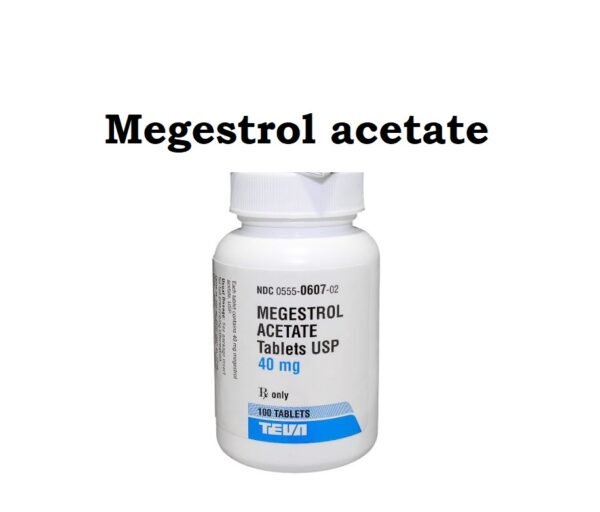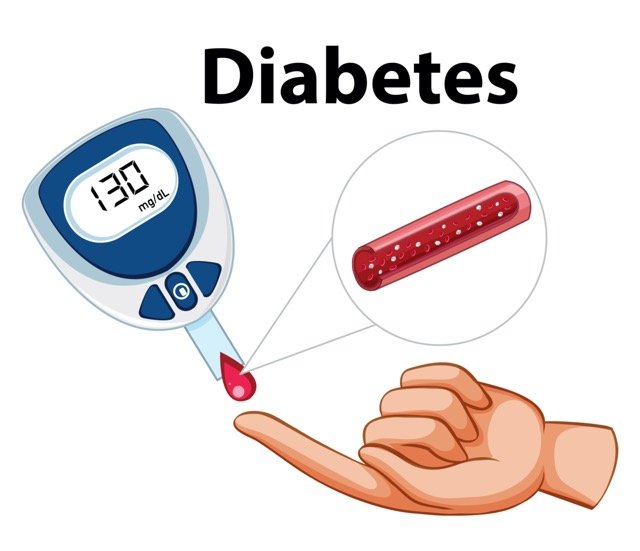Megestrol acetate is an antiestrogenic progestin that is used in the treatment of anorexia and cachexia caused by HIV infection, cancers, endocrine, and psychiatric disorders.
Megestrol acetate Uses:
-
Anorexia or cachexia:
- Suspension:
- Cachexia, anorexia, or unexplained substantial weight loss in AIDS patients are treated with it.
- Limitations of use:
- It is not intended to prevent weight loss.
- Treatment of the primary disorder is essential and treatment with megestrol should only be initiated once the primary disorder causing anorexia (such as cancer, infection, malabsorption, endocrine disease, kidney disease, or psychiatric disorder) is corrected.
- Suspension:
-
Breast cancer:
- The tablet formulation is indicated for the palliative treatment of advanced breast cancer
-
Endometrial cancer:
- It is indicated for the palliative treatment of advanced endometrial carcinoma.
-
Off Label Use of Megestrol acetate in Adults:
- It is used in the treatment of cancer-related cachexia
Megestrol acetate Dose in Adults:
Note:
- Megace ES suspension is not similar to other formulations mg for mg.
Megestrol acetate Dose in the treatment of Anorexia or cachexia associated with AIDS: Oral:
- Suspension:
- 625 mg daily initially (of the 125 mg/mL suspension)
- 800 mg daily (of the 40 mg/mL suspension)
- It has been discovered that doses between 400 mg and 800 mg per day are efficient.
Megestrol acetate Dose in the treatment of advanced Breast cancer:
- Oral: Tablet:
- For at least two months, take 160 mg each day in four equally spaced doses (each of 40 mg).
Megestrol acetate Dose in the treatment of advanced Endometrial cancer:
- Oral: Tablet:
- Split doses of 40 to 320 mg every day for a minimum of two months.
Megestrol acetate Dose in the treatment of Cancer-related cachexia (off-label):
- Although the optimum dose has not been established, weight increase was successful at doses of 160 to 800 mg per day, with higher doses surpassing 160 mg being linked to greater weight gain.
Megestrol acetate Dose in Childrens:
Note:
- On a mg-for-mg basis, Megace ES and other megestrol formulations are not similar.
Megestrol acetate Dose in the treatment of Appetite stimulant and anorexia associated with chronic illness such as cancer, cystic fibrosis, and HIV):
-
Infants ≥8 months, Children, and Adolescents:
- Oral:
- Tablets or 40 mg/mL suspension:
- The first dosage is one or two divided dosages per day of 7.5 to 10 mg/kg/day.
- To have the best result, the dose needs to be gradually increased.
- The dose could be lowered if weight gain becomes excessive.
- Treatment typically lasts between three and eleven months.
- The daily dose cap is set at 800 mg, or 15 mg per kilogramme.
- Tablets or 40 mg/mL suspension:
- Oral:
Megestrol acetate Pregnancy Risk Category: X
- It is not recommended for pregnant women with anorexia and cachexia due to HIV infection.
- It can cause harm to the fetus if administered during pregnancy.
- Before starting treatment for females with reproductive potential, it is important to evaluate your pregnancy status.
- Effective contraception should be used to treat anorexia and cachexia due to HIV infection in females with reproductive potential.
- Breakthrough vaginal bleeding can occur during treatment, which should be distinguished from menstrual bleeding.
Megestrol acetate use during breastfeeding:
- It is eliminated from breastmilk.
- Clinical studies showed that milk with higher concentrations of megestrol was found when it was given three hours before sampling.
- Due to the possibility of major adverse drug reactions, the manufacturer advises against continuing breastfeeding or giving mothers medications.
- Additionally, breastfeeding is not advised due to the risk of HIV infection.
Megestrol acetate Dose in Kidney Disease:
- No dose modifications for patients with liver illness have been included in the manufacturer's labelling.
- However, it should be used with caution because the urinary excretion of the drug is substantial.
Megestrol acetate Dose in Liver disease:
In the manufacturer's labeling, adjustments in the dose have not been provided for patients with liver disease.
Side effects of Megestrol acetate:
-
Cardiovascular:
- Hypertension
- Cardiomyopathy
- Chest Pain
- Edema
- Palpitations
- Peripheral Edema
- Cardiac Failure
-
Central Nervous System:
- Headache
- Pain
- Insomnia
- Abnormality In Thinking
- Confusion
- Convulsions
- Depression
- Hypoesthesia
- Neuropathy
- Paresthesia
- Carpal Tunnel Syndrome
- Lethargy
- Malaise
- Mood Changes
-
Dermatologic:
- Skin Rash
- Alopecia
- Dermatological Disease
- Diaphoresis
- Pruritus
- Vesicobullous Dermatitis
-
Endocrine & Metabolic:
- Hyperglycemia
- Decreased Libido
- Albuminuria
- Gynecomastia
- Increased Lactate Dehydrogenase
- Adrenocortical Insufficiency
- Amenorrhea
- Cushing's Syndrome
- Diabetes Mellitus
- Hot Flash
- HPA-Axis Suppression
- Hypercalcemia
- Weight Gain
-
Gastrointestinal:
- Diarrhea
- Flatulence
- Vomiting
- Nausea
- Dyspepsia
- Abdominal Pain
- Constipation
- Oral Moniliasis
- Sialorrhea
- Xerostomia
-
Genitourinary:
- Impotence
- Urinary Incontinence
- Urinary Tract Infection
- Urinary Frequency
- Breakthrough Bleeding
-
Hematologic & Oncologic:
- Leukopenia
- Sarcoma
- Tumor Flare
-
Hepatic:
- Hepatomegaly
-
Infection:
- Candidiasis
- Herpes Virus Infection
- Infection
-
Neuromuscular & Skeletal:
- Weakness
-
Ophthalmic:
- Amblyopia
-
Respiratory:
- Cough
- Dyspnea
- Pharyngitis
- Pulmonary Disorder
- Pneumonia
- Hyperventilation
-
Miscellaneous:
- Fever
Contraindications to Megestrol acetate:
- Allergy to any drug or component of the formulation
- Pregnancy
Notice:
- Although cross-reactivity is not documented for other progestins, it may exist due to structural, chemical and functional similarities.
Warnings and precautions
-
Suppression of the adrenals:
- Long term use may be associated with hypothalamic-pituitary-adrenal axis suppression.
- Hypoadrenalism is a condition in which patients stop taking long-term megestrol and discontinue treatment. This can be especially true during stressful times.
- Hypoadrenalism should be checked and replacement doses of rapid-acting, stress-reducing glucocorticoids administered to patients.
-
Cushing syndrome
- Cushing's syndrome has been linked to long-term use.
-
AIDS-related cachexia
- It is unknown if it has any effect on viral replication when used to treat HIV-related cachexia. Monitoring via PCR is essential.
-
Diabetes:
- The drug can cause impaired glycemic control over long periods and new-onset diabetes mellitus.
-
Thromboembolism
- Patients who have a history of thromboembolic conditions should be cautious when taking the drug.
Megestrol acetate: Drug Interaction
|
Antidiabetic Agents |
Hyperglycemia-Associated Agents may diminish the therapeutic effect of Antidiabetic Agents. |
|
C1 inhibitors |
Progestins may enhance the thrombogenic effect of C1 inhibitors. |
|
Choline C 11 |
Antiandrogens may lessen Choline C 11's therapeutic impact. |
|
Herbs (Progestogenic Properties) (eg, Bloodroot, Yucca) |
Could make progestins' harmful or hazardous effects worse. |
|
Risk Factor D (Consider therapy modification) |
|
|
Anticoagulants |
Anticoagulants' therapeutic effects may be lessened by progestins. More particular, some progestins and progestin-estrogen combos may have prothrombotic actions that work against any anticoagulant effects. Management: Carefully balance the progestins' possible advantages against their potential increased risk of thromboembolism and procoagulant effects. Under some conditions, use is deemed contraindicated. For particular advice, consult the relevant policies. |
|
Pomalidomide |
Pomalidomide's thrombogenic action may be strengthened by progestins. Care should be taken while using hormone replacement treatment, and hormonal contraceptives are not advised, according to Canadian pomalidomide labelling. These precise guidelines are not included on the pomalidomide labelling in the US. |
|
Risk Factor X (Avoid combination) |
|
|
Dofetilide |
Megestrol may raise the level of Dofetilide in the serum. |
|
Indium 111 Capromab Pendetide |
Antiandrogens may reduce Indium 111 Capromab Pendetide's ability to diagnose. |
|
Ulipristal |
Ulipristal's therapeutic effects may be lessened by progestins. Ulipristal may lessen the progestins' therapeutic effects. Management: Avoid progestins within 12 days of quitting ulipristal for uterine fibroids (Canadian indication); avoid progestins within 5 days of stopping ulipristal for emergency contraception (U.S. indication). |
Monitoring parameters:
- Thromboembolic events
- Blood pressure
- Weight
- Plasma glucose
How to administer Megestrol acetate?
- It is administered orally.
- Before usage, the suspension is thoroughly shaken.
- You can take the 625 mg/5 mL suspension without consideration to meals.
Mechanism of action of Megestrol acetate:
- It is a synthetic oestrogen that interferes with the oestrogen receptor system and has antiestrogenic qualities.
- Megestrol decreases LH titers because it interferes with the normal estrogen cycles.
- It can also affect the endometrium.
- Megestrol, a progestin that has antineoplastic properties, is known.
- It is thought to inhibit the effects of the luteinizing hormone, which is mediated by the pituitary.
- By opposing the metabolic effects of catabolic cytokines, it can increase appetite.
The onset of action:
- Breast or endometrial cancer: At least two months of continuous treatment;
- For weight gain: 2 - 4 weeks
Absorption:
- Well absorbed
Metabolism:
- Hepatic (to free steroids and glucuronide conjugates)
Half-life elimination:
- Suspension: 20 to 50 hours;
- Tablet: 34.2 hours (range: 13 to 105 hours)
Time to peak serum concentration:
- Suspension: 5 hours;
- Tablet: 2.2 hours (range: 1 to 3 hours)
Excretion:
- Urine (57% to 78%; 5% to 8% as metabolites);
- feces (8% to 30%) within ten days
International Brands of Megestrol acetate:
- Megace ES
- Megace Oral
- Apegestrol
- Apetrol
- Endace
- Maygace
- Megace
- Megace ES
- Megace Oral
- Megaplex
- Megase
- Megastrol
- Megatus
- Megejohn
- Megesia
- Megesin
- Megestat
- Megex-I
- Megostat
- Mestrel
- Mestrol
- Norea
- Onistrol
- Tracetate
Megestrol acetate Brand Names in Pakistan:
Megestrol Acetate Tablets 40 mg |
|
| Medestrol | Pharmedic (Pvt) Ltd. |
| Megace | Glaxosmithkline |
| Progace | Medinet Pharmaceuticals |
Megestrol Acetate 160 mg Tablets |
|
| Megace | Glaxosmithkline |
| Megestil | Scharper Pharmaceuticals (Pvt) Ltd. |
| Progace | Medinet Pharmaceuticals |







